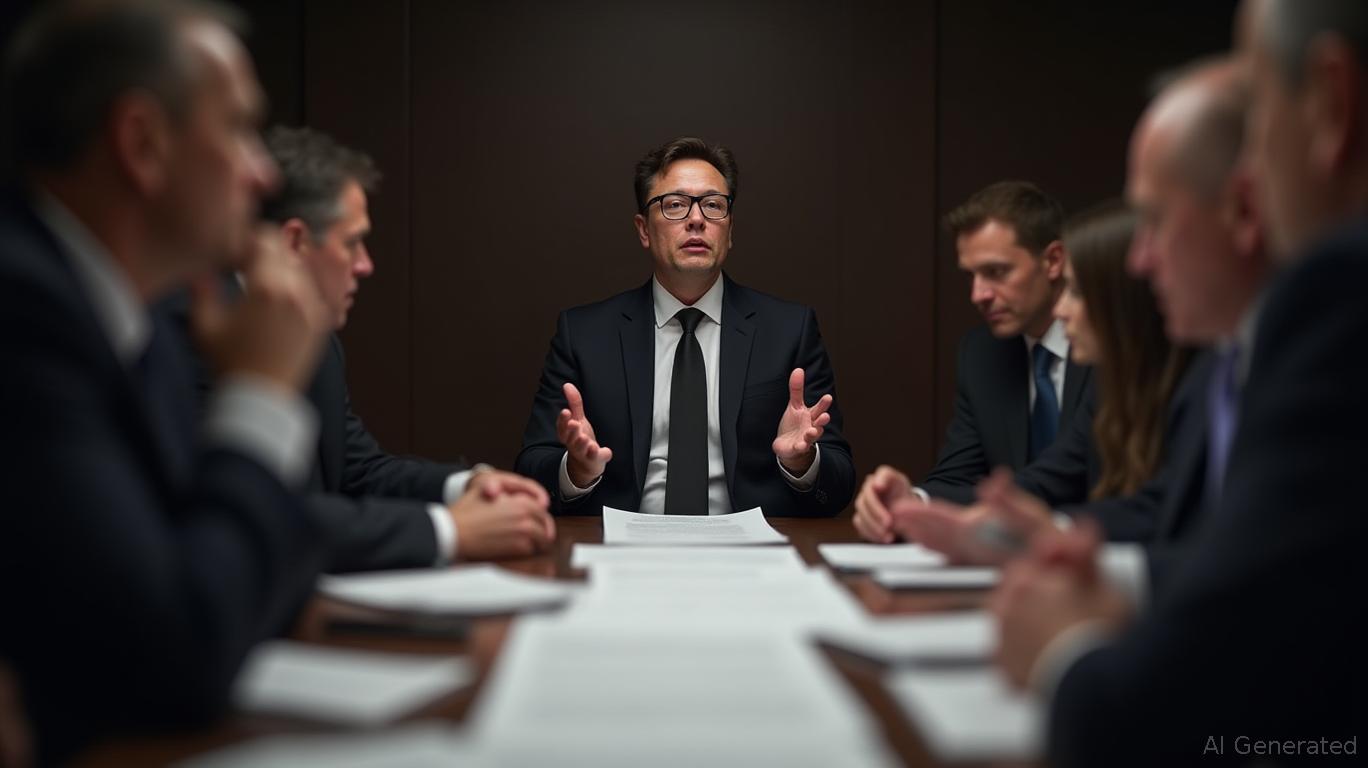Tesla’s $1 Trillion Musk Compensation Plan: Motivation for Expansion or Overly Generous?
- Tesla shareholders will vote on a $1T compensation package for Elon Musk, requiring $8.5T market cap and tech milestones. - Supporters argue performance-based incentives drive growth, while critics call it excessive and risk corporate governance. - Approval could trigger legal challenges, as Musk's 2018 deal was voided, and may destabilize Tesla if he leaves. - Analysts are divided, with some viewing it as necessary for leadership retention and others as unwarranted reward. - The debate highlights high-s
Shareholders of Tesla Inc. (TSLA) are scheduled to cast their votes on November 6 regarding a highly debated compensation plan for CEO Elon Musk, which could be worth as much as $1 trillion, according to

To unlock the payout,
Baker, whose firm is in favor of the plan, maintains that tying compensation to performance is vital for Tesla’s continued expansion. He wrote on X that "shareholders should generally support thoughtfully structured performance-based CEO compensation packages because they incentivize CEOs to create transformational growth and value." Tesla’s Board Chair Robyn Denholm has cautioned that Musk may depart if the package fails, which could unsettle the company.
On the other hand, prominent institutional investors such as CalPERS and the New York State Retirement Fund intend to vote against the plan. Proxy advisors Glass Lewis and Institutional Shareholder Services have also urged a no vote, calling the package excessive, while Musk has labeled these firms "corporate terrorists."
Should the compensation plan pass, it could have a major effect on Tesla’s stock, which has climbed 9% so far this year and 76% over the past year. Stocktwits data indicates that retail investors remain largely pessimistic, though message activity has leveled off. Analysts are split, with some arguing the package is crucial to keeping Musk at the helm, while others see it as an unnecessary reward given Tesla’s already lofty valuation.
In other news,
Disclaimer: The content of this article solely reflects the author's opinion and does not represent the platform in any capacity. This article is not intended to serve as a reference for making investment decisions.
You may also like
UK’s Stablecoin Regulations Ignite Discussion: Balancing Progress and Security in Effort to Compete with US
- The Bank of England (BoE) announced a stablecoin regulatory framework with £20,000 individual and £10M business holding caps to mitigate redemption risks and ensure liquidity. - Systemic stablecoin issuers must hold 60% reserves in UK government debt and 40% in BoE non-interest-bearing accounts, with phased flexibility for new entrants. - The rules, open for consultation until February 2026, aim to balance innovation with stability while aligning with U.S. regulatory speed, despite industry concerns over

AI’s Bold Bet: Some Soar While Others Falter Amid Turbulent Tech Transformation
- AI sector volatility highlights divergent outcomes as firms adopt agentic AI systems, with SoundHound AI and Rightmove exemplifying contrasting success and risk. - SoundHound AI's Red Lobster partnership and margin improvements reduced risk perception despite high valuation, driving analyst optimism about enterprise AI adoption. - Rightmove's 25% stock plunge followed AI investment plans that slashed 2026 profit forecasts, reflecting investor skepticism toward short-term profitability trade-offs. - C3.ai
Bitcoin News Update: Nationalist Cryptocurrency Fraud Cons People Out of $6.5 Billion, Affecting 128,000
- Chinese "Cryptoqueen" Zhimin Qian faces UK sentencing for orchestrating a $6.5B Bitcoin Ponzi scheme targeting 128,000 victims, including elderly investors. - Her Lantian Gerui company used patriotic marketing and false 200% returns promises, with proceeds funding a £17,000/month London mansion and £6B in seized crypto assets. - UK authorities seized 61,000 BTC (worth $6B) and are pursuing asset recovery, as Qian's case highlights risks of unregulated crypto investments amid global regulatory crackdowns.

Pi Network’s Mainnet: Evolving from Smartphone Mining to an AI-Powered Blockchain Platform
- Pi Network's Testnet 1 achieves near-zero transaction failures, accelerating Mainnet v23 launch after successful high-volume stress tests. - Price jumps 3.5% as AI integration with OpenMind and decentralized computing prove scalability, while KYC streamlining boosts user onboarding. - Upcoming Mainnet will enable smart contracts and DeFi tools, but faces challenges including 10% price decline and only 296 active nodes currently operational.
